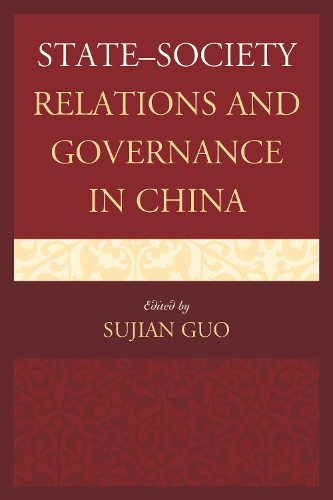
StateSociety Relations and Governance in China
(Hardback)
Publishing Details
StateSociety Relations and Governance in China
By (Author) Sujian Guo
Contributions by John Creed
Contributions by Sheng Ding
Contributions by Joseph Fewsmith
Contributions by David S. G. Goodman
Contributions by Wenshan Jia
Contributions by Guoli Liu
Contributions by Josef Gregory Mahoney
Contributions by Edwin E. Moise
Contributions by Nele Noesselt
Bloomsbury Publishing PLC
Lexington Books
9th July 2014
United States
Classifications
Professional and Scholarly
Non Fiction
320.451
Physical Properties
Hardback
254
Width 164mm, Height 234mm, Spine 23mm
508g
Description
Statesociety relations and governance are closely related areas of study and have become important topics in the social sciences in the past decades, not only in developed countries but also in the developing world. In China, state-society relations have been changing in the new era of reform and opening, and governance has become a central concern in policy practice and in academia. In this wide-ranging collection of essays, written by scholars from both inside and outside China, the contributors explore the complexity of the changing state-society relationship and the modes and practices of governance in China by combining theoretical exploration and empirical case studies.
Reviews
This volume brings together a group of essays by renowned China scholars examining a broad variety of state-society relations and governance issues in China. It is a cutting-edge volume addressing state-society relations from a theoretical, comparative, and historical perspective. -- Thomas Heberer, University Duisburg-Essen and Zhejiang University
Most classical political theory posits that the structure and policies of the government and state reflect underlying social realities. This, however, would not seem to be true of 'totalitarian' regimes. From 1949 into the early 1980s the social structure in China was in effect an artifact of the political system, dominated and shaped by the ruling elite according to the elites ideology and its evolving internal processes. Over the past generation and more Chinese society has become increasingly varied and complex; and while both the political and even social systems remain under the control of the Communist party, the Party itself has become more responsive to social interests and social interests have penetrated the structure and policies of the Party. China is developing a system different both from the previous totalitarian one and also from Euro-American pluralistic liberal democracy. This collection of studies by noted scholars of Chinese politics and political sociology traces the effects of the increased complexity of Chinese society and of state-societal interactions, making a valuable contribution to our understanding of contemporary Chinese politics and culture. -- Peter Moody, University of Notre Dame
Author Bio
Sujian Guo is distinguished professor at Zhejiang University and Fudan University. He is also full professor in the Department of Political Science and director of the Center for USChina Policy Studies at San Francisco State University.
